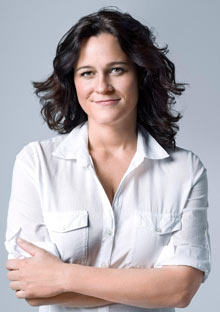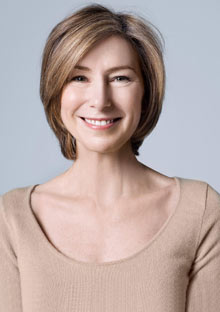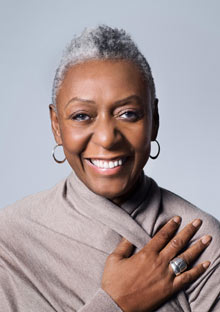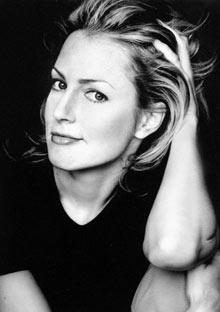
Photo: Brigitte Lacombe
Believe it or not, it's possible. (Without surgery, drugs, or denial.) Five women explain how they came face-to-face with—and even grew to appreciate—what they see in the mirror.
All Dolled Up
Fashion writer Lynn Yaeger celebrates being one of a kind.
Here are some reasons I had a hard time making myself look like Cheryl Tiegs on the cover of Seventeen magazine: Unlike Tiegs, I had flappy ears, chubby cheeks, tiny lips, and virtually no eyelids or eyebrows—all of which made me look more like the Parisian ladies of the evening in a 1930s Brassaï photograph than a California-blonde cover girl.
The gulf between the reality of my looks and the cultural ideal only widened when I began to work in the fashion industry. Early on, I decided to ignore the industry's dictates—so stifling, unattainable, judgmental—and make my own rules. I had long admired women with strong signature looks—Anna Piaggi, Diana Vreeland, Isabella Blow—for whom the fashion world seemed to make an exception. And I found myself reaching far outside the box for role models: to the women in Pre-Raphaelite paintings (those floaty clothes suited my physique far better than jeans and a T-shirt); to silent-movie heroines (their pale complexions were easy for me to replicate); even to Victorian dolls (whose round faces and rosebud mouths reminded me of me).
Inspired, I started experimenting. The copper henna I threw on my head to give my hair a quirky tint was a miracle—coating my limp bob and making it bouncier than I'd ever dreamed possible. And maybe there was nothing to be done for my abbreviated lids, but I could work wonders with my lips, exaggerating them into a dark Kewpie-doll shape that, unlike eyeshadow, suited me to perfection.
People have asked how I get the courage to walk the streets in, say, a shredded Comme des Garçons coat over a tutu, with metallic orange hair. I owe my confidence at least in part to my parents, who were convinced I was the cutest thing on Earth and told me so every single day. (Recently, seeing my reflection at a party, I could almost hear my mom saying, "Lynnie, you look so pretty!")
Though some of my more extreme choices have provoked laughter or incredulity, I also get more compliments than I could have imagined. This may be because I live in New York City, where a certain level of eccentricity is appreciated. But I like to believe that no matter where I lived, people would come to respect—maybe even like! admire!—the steps I've taken to create my own nutty, undeniably unique, and for me, deeply satisfying, look.
How a haircut let Bliss Broyard see herself in a bold new way

Photo: Brigitte Lacombe
How a haircut let her see herself in a bold new way.
The bride offered me a long black Calvin Klein wrap dress, promising it would hug me in all the right places. And I'd made an appointment for an "updo" at a Madison Avenue salon. In the same way that I was learning to coax into language a vision of the world that felt real and true, I hoped the salon could conjure, if just for a night, the self of my dreams. Once in the chair, however, I learned that because my hair was so long—halfway down my back—the updo would cost $80. I eyed myself in the mirror. My long curls, ample breasts, and small behind were among the things that made me feel attractive. Yet suddenly I heard myself asking: How much to cut off all my hair? Only $5 more. Five dollars to look boldly, radically different. I sat, heart pounding, wondering if I'd finally found the nerve to let myself be seen. Do it, I said.
The stylist turned the chair away from the mirror. Foot-long clumps of curls fell to the floor. Staring out the window, I watched a passing stream of deliverymen, nannies, and businesspeople. How many of them were happy, leading the lives they'd imagined? Did my newfound contentedness with my own life show?
Are you ready? the stylist asked. Slowly, he turned me back to my reflection. I had a very short pixie cut, parted on the side . I thought, This is my face. I thought how I could no longer hide. I thought that the woman in the mirror looked the way I'd always pictured I might look. I thought that I looked beautiful.
Since then, of course, my hairstyles have changed. But that moment of recognition stays with me still.
Why O' s beauty director likes to set the bar a little lower

Photo: Brigitte Lacombe
Why O's beauty director likes to set the bar a little lower.
The problem with too much looking at others' beauty is that you raise the bar for your own. It's the same sort of trouble you'd invite if you watched only 1930s romantic comedies: After a while you'd think life was meant to be a series of delightful coincidences punctuated by cocktails and droll repartee. Such thinking is called upward comparison, and a recent study at the University of Manchester in England showed that engaging in it regarding your looks results in less satisfaction with your body and unhealthy compensatory behaviors (like eating disorders and cosmetic surgery). Better to engage in comparing downward, the study showed. People who hold themselves up to those they perceive as less attractive are psychologically healthier.
I wasn't aware of this study when I developed my own little trick a few years ago. Sometimes when I feel lousy about my looks (and my usual pep talk about celebrating my assets fails), I picture a face with little piggy eyes, a drooping, fleshy nose, a wet slash of mouth, the whole thing sallow and sagging, really something awful. I prepare myself for this unpleasantness right before I look in the mirror. And then, no matter how bad I thought I looked, what I see is an enormous improvement: Ordinary! Exquisitely ordinary.
For former model Bethann Hardison, rejection was never an option.

Photo: Brigitte Lacombe
For the former model, rejection was never an option.
Comedian Ali Wentworth appreciates the beauty of a sense of humor.

Photo: Courtesy of Ali Wentworth
The comedian appreciates the beauty of a sense of humor.
Uh-oh. Let's try this again In general, how she feels: I like my face. I think I look better in real life than I do in photos.
One of the best things she inherited from her mother: The feeling that I'm kind of bare-bones attractive. My mother never wears makeup, never fusses about her appearance. And I think she's beautiful. She makes me feel like I could throw on some lip gloss and call it a day.
One of the best things she concluded from being an overweight teen: I chose not to care too much about vanity. That's when I decided I was going to hone my sense of humor and develop a winning personality.
What she's grateful for, looks-wise: I've got the basics. Hair (blonde), eyes (blue), a mouth (with lips). And I don't have a finger growing out of my forehead.
11 illuminating ideas that will cast you in a prettier light.




